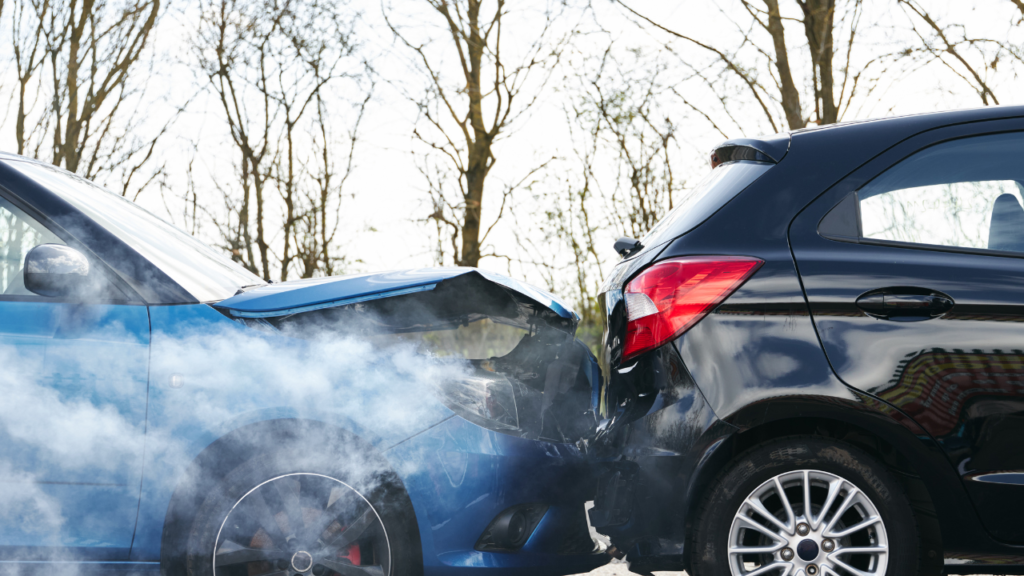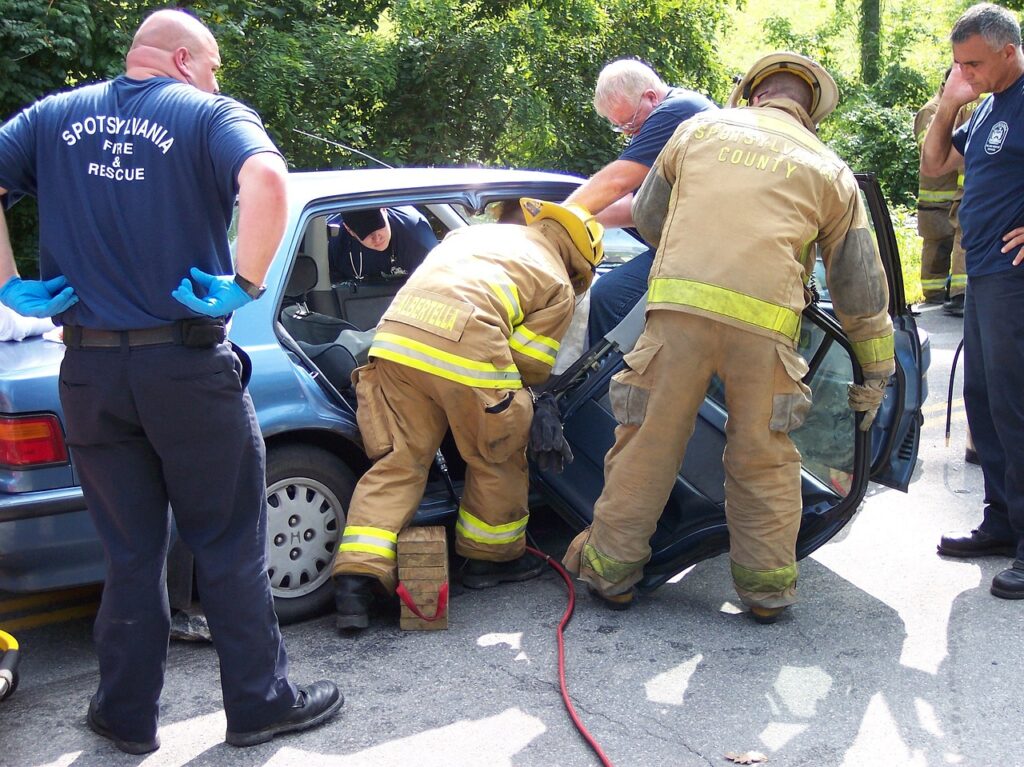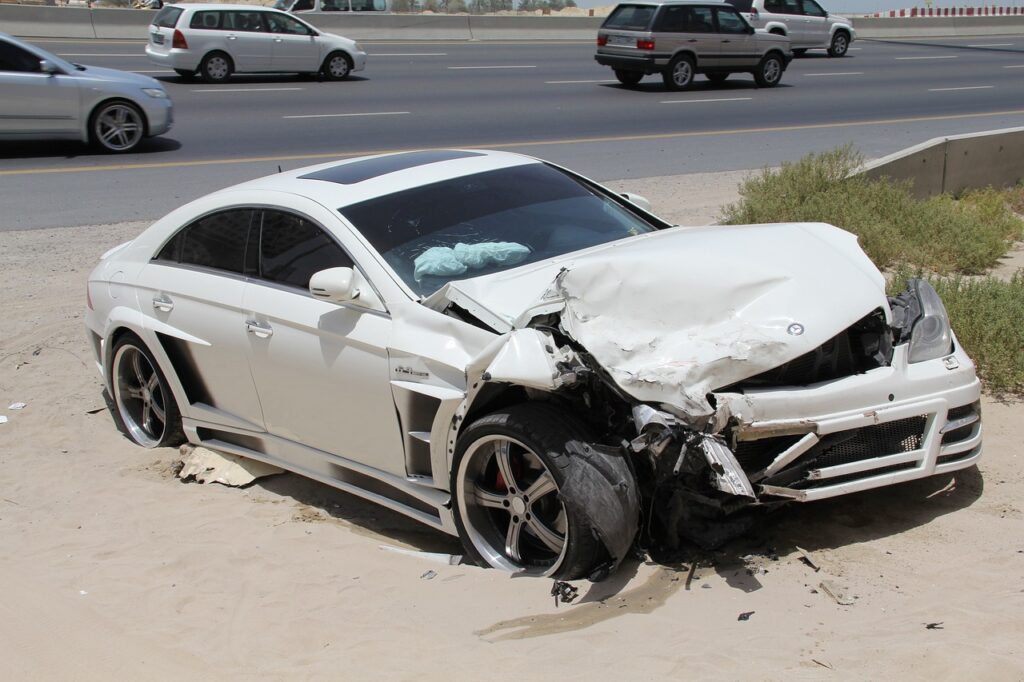Leaving the scene of an accident no one else involved: a hit and run lawyer answered.
According to traffic laws in almost all states, you must stop at the scene of an accident and share with the other driver your contact information, and insurance information, render help, and finally report the accident to the police.
In fact, leaving any scene of an accident is a criminal offense and is punishable by law. Depending on the gravity of the crime, the person that leaves the scene of an accident faces up to 15-30 years in prison on top of heft monetary fines.
Recommended reading: Do you file a lawsuit after a car accident no damage, and no contact car accident?
But, there are certain collisions where you may be involved in an auto accident but luckily or by bad luck, you are the only person involved in the crash. Ever heard of such scenarios?
Examples of collisions where you and your car may be the only participating things include run-off-road collisions, fixed-object collisions, single-vehicle collisions, rollover collisions, and many others.
Okay. so you just had one of the above-mentioned collisions where no any other person, or another car is involved. Yes, the law says, please stop at the scene of an accident. In such, a scenario, is there a valid reason for you to stop at the scene of an accident?

If there are no other affected persons or cars, why would you stop at the scene or why do you need to report the accident to the authorities? Do you think it’s worth it reporting single-car accidents?
Well, this article explains the legal implications of leaving the scene of an accident, even if there is no one else involved. I will also tell you where reporting such crashes is not needed, so sit tight and enjoy this educational material.
Page Contents
What constitutes leaving the scene of an accident?
Yearly, more than 7 million car accidents occur here in the United States of America. According to statistics, more than 700,000 crashes are hit and run accidents.
A hit and run accident can be defined as a crash where one of the drivers leaves the scene of an accident without observing traffic laws required for auto accidents.
The driver that flees the scene of an accident commits a crime called a hit and run, and depending on the severity of the accident, he/she faces very harsh legal implications as I will explain later in this article.
Recommended readings: Will Your Car Insurance Company Provide a Lawyer after a car accident?
According to Johnson, a car accident attorney, it’s an act of smartness to report any car crash even if no one else is involved because someone else could take advantage of the situation and make fraud claims from the insurance company or file false lawsuits.
Legal Consequences Leaving the scene of an accident no one else involved?
“Irrespective of the circumstances and severity of the accident, stopping at the scene of an accident and reporting the crash where necessary is the most important thing as far as car accidents are concerned”, says Alexander Bylinkin, a hit and run lawyer.

“Failure to stop at the scene of an accident implies inviting for yourself unnecessary civil claims, lawsuits, traffic tickets, and other legal consequences”, says Alexander Bylinkin.
The following are potential legal consequences of leaving the scene of an accident, even when no one else is involved.
1. Criminal charges. You must locate the owner of the properties you could have damaged. Yes, you may not have been in a collision with any other car, but you could have damaged a building, mailbox, traffic lights, etc.
A driver that leaves the scene of an accident involving property damages only is likely to face charges of a hit and run misdemeanor.
Yes, the charges of a misdemeanor hit and run are not so severe as compared to when someone got injured or died (a hit and run felony). But, no one wants to spend for instance up to 12 months in jail or up to $2,000 in fines, right?
2. Civil claims. If your car rolled over and destroyed people’s property, you may be held liable for the damages done to the properties.
The owners of the property have the right to file a civil claim or file lawsuits against you to recover from their losses.
3. Traffic tickets. A nearby traffic camera could reveal that the cause of your fixed-object collision was ‘text-while-driving’, or you had any traffic violations.
In such scenario, traffic officers who respond to the scene of an accident could choose to issue you a traffic ticket depending on the circumstances of the accident.
4. Fines. Leaving the scene of an accident involving only property damages leads to charges of a minor hit and run (misdemeanor).
“In most states, the penalties for a minor hit and run include jail time of up to 12-24 months, a fine of up to $1,000, and suspension/revocation of your driver’s license for up to 6 months”, says Amanda Varrone, a car accident attorney.
Moral and Ethical Considerations of Leaving the scene of an accident no one else involved
Regardless of whether there was someone else involved or not, leaving the scene of an accident has moral and ethical considerations.
The following are some of the moral and ethical consequences of leaving the scene of an accident:
1. Responsibility and accountability. Leaving the scene of an accident goes against the principles of responsibility and accountability.
Recommended reading: What’s comprehensive car insurance?
Every driver should be responsible for the outcomes of getting involved in a collision, regardless of who else was involved in a crash. Leaving the scene of an accident shows that the driver tried to evade their moral obligations to face the repercussions.
2. Duty to render aid. There may be no one involved in the accident but still, some property could have been damaged. You should stay at the scene to render aid to whoever needs it.
3. Trust in the Community. Leaving the scene of an accident erodes trust in the community. Accidents are so devastating and require a collective commitment from all drivers.
Leaving the scene of an accident creates a culture of irresponsibility and this may cause more dangers in the community.
4. Impact on Public Safety. You must report any car accident to the authorities even if no one else was involved. Reporting crashes to the authorities helps in planning activities.
For example, authorities use crash reports to determine accident-prone areas, improve traffic patterns, and plan for prevention measures.
Failure to report the crash means limiting the authorities’ access to such valuable information and in the long run, hinder these efforts and impede the overall well-being of their community.
5. Legal and Social Consequences. I already discussed some of the legal implications of leaving the scene of an accident. Socially, individuals who leave the scene may face public scrutiny and damage their reputation within their community.
Reporting Procedures for hit and run accidents
You will need to first familiarize yourself with traffic laws in your area of jurisdiction.
This because, some states require drivers to report only accidents that involved injuries/deaths or accidents that resulted in property damages that exceed certain amounts of $$.

For instance, some states require you to report any auto accident regardless of the injuries/damages, whereas, in others, you must report crashes involving injuries/deaths or whose property damages exceed $500.
Having that said, the following are steps you need to follow to report auto accidents:
1. Stop at the scene. This is the very first step towards reporting the accident to the authorities. Stopping at the scene of an accident is also required by law unless you have a valid reason that stopped you from observing this legal obligation.
2. Asses the situation for damages/injuries. The consequences of leaving the scene of an accident involving injuries/deaths differ from when there is only property damage or no injuries.
Also assessing for injuries will help you decide whether the accident is worth reporting to police or not, especially in states where you only need to report accidents with certain severities.
3. Contact responsible authorities. You must report the crash to the police according to what the law requires you to do.
If you had a single-car accident but damaged any nearby property, you must stop at the scene and hunt for the owners or authorities. Failure to do so may lead to charges of property damages hit and run.
In connection with the above, the following are some of the importance of reporting auto accidents to the authorities.
1. Helps in settling reliability issues. Police officers know the right questions to determine what transpired between the drivers. The police will also try as much to find out why the accident occurred.
2. Insurance claims. It’s clear many insurance companies do not rely on what is stated in police car accident reports. But the information stated in the crash report could be helpful in negotiating a claim settlement.
3. Facts of an accident. Police crash report helps in recording facts of the accident. For instance date of crash, direction of travel, type of cars, names of drivers, weather/road conditions etc.
4. Rightful version of things. Drivers especially those that could have caused the accident tend to deny things and others will try to alter statements in order to avoid being held liable.
The information recorded in the police report could help in telling what really happened.
5. Exhibits in courts of law. Very few states allow the submission of police reports as exhibits or proofs of evidence, whereas in other states, police crash report adds no value.
“Having said so, every driver that is involved in the accident should take their time to collect evidence in relation to the accident”, Amir Isaiah, a hit-and-run attorney at Morgan and Morgan.
“Evidence to convict a hit and run driver includes eyewitness testimony, surveillance footage, vehicle debris, license plate information, confessions, and forensic analysis”, concludes Amir Isaiah.
Importance of Documenting and Seeking Medical Attention after a hit and run accident.
If you or your loved one is injured in a car crash, seeking medical attention is key. To receive a settlement for the damages/injuries you incurred, you must prove that you sustained injuries, and medical records will help you.
You must document your injuries, treatment received, and any new symptoms. You must also record how the injuries are affecting your routine activities.
It’s quite clear that some injuries do not show up immediately after the accident. injuries like brain damage, whiplash, and others could show up hours or days after the crash.
Recommended article: What Happens If You Have a Car Accident Without Insurance?
Failure or delay in seeking medical attention could hamper your claim settlement process. The insurance company or the at-fault driver may deny you a settlement by arguing that your failure to seek medical help shows you were not injured in the accident.
Leaving the scene of an accident Prevention and Awareness
It’s the duty of every driver to drive responsibly with care and duty to protect others. The following are tips and strategies for preventing accidents and minimizing the likelihood of leaving the scene:
1. Driver awareness. Every driver should be aware of the possible consequences of leaving the scene of an accident.
2. Responsible behavior. For instance, driving under the influence (DUI) or running a red light signifies irresponsible driving behaviors.
3. Adhering to traffic laws. I have been singing that traffic laws differ from place to place. Though what happens to a leaving the scene of an accident depends on where the crime took place, getting familiar with traffic laws in your area of jurisdiction of course helps.
Conclusion.
Leaving the scene of an accident is a criminal offense whether it was a single-car accident and involved no one else, or there were other people/cars involved.
Though it may seem a simple case, leaving the scene of an accident with no one involved could lead to criminal charges, civil claims, traffic tickets, and other moral and ethical repercussions.
In conclusion, Leaving the scene of an accident, even without others involved, is generally an offense. Laws vary, but it often requires staying, providing aid if needed, reporting the incident, and exchanging information.
Penalties can include fines, license suspension, and potential criminal charges. Consult local laws for accurate information.
Leaving accident scene alone is illegal. instead, Stay responsible. Report incident and cooperate with authorities to ensure safety and accountability.
Source:
1. What happens when one leaves the scene of an accident? Website: https://valientemott.com/legal-terminology/what-happens-when-someone-leaves-the-scene-of-an-accident/#:~:text=If%20a%20person%20leaves%20the,thousands%20of%20dollars%20in%20fines.
2. Leaving the scene of an accident, website: https://www.hg.org/legal-articles/leaving-the-scene-of-an-accident-34319
3.Consequences of hit and run accident/crime, website: https://www.nolo.com/legal-encyclopedia/consequences-hit-run-accident.html
4. Single-Vehicle Car Accidents: Damages, Lawsuits & Liability. website: https://www.enjuris.com/car-accident/single-vehicle-car-accident/








